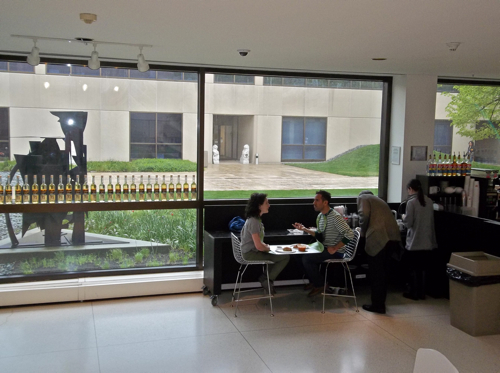Failure to Lunch

By Diego Arispe-Bazan
MA'11 University of Chicago and Smart curatorial intern
At a salon hosted by threewalls a few weeks ago, with a group of artists, sociologists, and other practitioners working on various social engagement projects (including Martha Bayne of Soup and Bread and the Smart Museum's own Stephanie Smith), the conversation turned for a moment to the possibility of productive failure. Martha shared a story. Once, at a Soup and Bread event, she was chastised by a visitor for the lack of vegan options, something she had no control over, as meals brought for each iteration are donated, and their contents are up to each cook. It seemed draconian on the one hand to demand that cooks produce vegan soups; it seemed draconian, on the other, to deny vegans the ability to participate. Not providing vegan soups, a type of institutional failure, is an example of the inability to accommodate, to welcome the guest or viewer into the situation via our sensory or aesthetic offerings. However, these conflicts provide a gateway into exploring a crucial aspect of hospitality: failure to lunch.
I considered Jean Anthelme Brillat-Savarin's famous phrase, currently displayed in the Feast exhibition: "to invite people to dine with us is to make ourselves responsible for their well-being for as long as they are under our roofs." Hosting, therefore, is not purely about providing good food, but rather providing a good meal. When we unwittingly serve our guests a dish they find atrocious, we, as good hosts, don't simply give up. We don't blame them for their lack of taste. We don't have a hearty chuckle and keep eating as if nothing was the matter. Instead, as obliging hosts, we redouble our efforts: we offer something else, ask the guest to explain her opinion. Hopefully, we laugh together. Blatant failure, forcing a new exchange in order to overcome the impasse, leaves both guest and host with a new set of relational tools to deal with disappointment, discomfort, etc. in their social repertoire.
Yet there is still an insistence, and expectation of success. At threewalls, social workers, anthropologists and sociologists involved in participatory projects wondered: "will the communities we choose to work in respond positively--will they eat what we're serving?" How can the success of projects like Occupy Yr. Home or even the International Dinner Party, be measured?
The National Bitter Melon Council, for example, has come up against this question repeatedly. In their manual, they preemptively warn us about the bitter taste of the bitter melon fruit, a symbol and material in much of their work. In one of the texts in the NBMC's Better Living Through Bitter Melon Manual, Louisa McCall, Program Director of the LEF Foundation (2000-2008), poignantly remarks: "to what extent did we need aesthetic outcomes from art projects?" It seems to me that there is inevitably an aesthetic outcome, just as every meal has an olfactory and gustatory outcome. And they are comparable: they can be imperceptible, subtle, they can dissipate quickly or spread wildly in multiple directions. And of course, they can be colossal failures.
Ultimately, the gesture is key. We prepare our dream meal just as orchestrating participatory pieces in new communities -- we do so at the peril of our confidence. But in the common adversity of the failure, a shared, learned practice of generosity emerges, a conversation between hosts and guests, artists and audience, impossible without the gesture's extension.